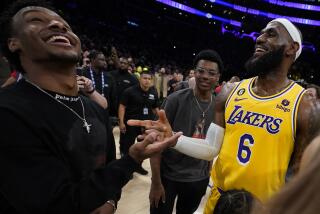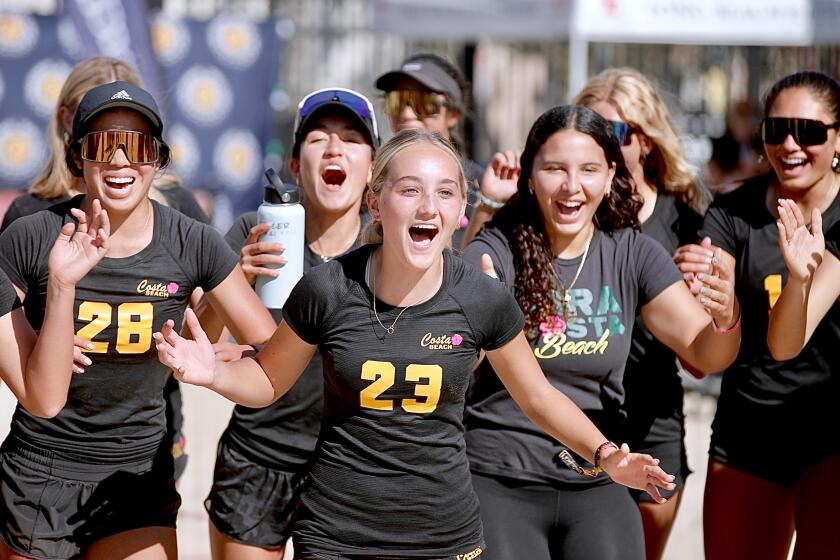Philosophical Differences Prompted Williams’ Move
- Share via
Brian Williams would like to remove any lingering doubt about why he transferred from the University of Maryland to the University of Arizona in July 1988.
“A lot of people didn’t understand why I was leaving,” he said, “like it was, ‘Oh, he wants to go home, he wants to go back to the West Coast,’ which is totally unfounded. I looked at it strictly from the basketball standpoint.
“I was fine there as far as the social life. I was fine there as far as the academics. But I said to myself, ‘Where do I want to be in a few years, and what coach do I want to be playing under and in what kind of system?’ I didn’t think I could be there under Bob Wade.
“When I said it was a difference of philosophy, it was a difference of philosophy -- and I’m not talking about what he thinks about Socrates. I’m talking about how he views basketball, what his game theories are, how he deals with people. That’s it in its entirety. People saw that, and he’s not the head coach anymore.”
But the nearly 21 months between Williams’s last game for the Terrapins and his first for the Wildcats seem to have softened his view of his year in College Park. After all, it was a freshman year during which he achieved a spring-semester grade-point average of 3.0 and basketball averages of 28 minutes, 12.2 points and six rebounds in 29 games, all of which he started. He was named Atlantic Coast Conference newcomer of the year and he helped lead Maryland’s turnaround from an 0-14 ACC record in 1986-87 to the second round of the 1988 NCAA tournament.
“I had a good time, all in all,” he said after helping Arizona defeat Michigan in last Saturday’s Hall of Fame Tip-Off Classic in Springfield, Mass. “I don’t know if it’s been the time that’s changed the bitterness of the things that went on or what. I mean, I would never second-guess my decision. I’m glad I’m here and don’t even think about what would have happened if I had decided to stay. But I wish them (the Terrapins) the best of luck. I still have a lot of good friends on that team and I hope they do really well.”
As for Wade, he said: “I also wish him the best of luck. I hope he sees the next position he’s in to where he can help it and change it around and have something much more positive come out of it. We all did something that wasn’t quite in our best interests, but we can learn from it.”
Wade was not available to comment.
Among the things Williams seems to have learned is Arizona is the place for him. He didn’t like Wade or Wade’s system of play. He praises Wildcats Coach Lute Olson and his system. He was uncomfortable with a Terrapins team that was fractionalized in large part by the transition from Lefty Driesell to Wade.
He speaks enthusiastically about the closeness of Arizona’s players. The East Coast’s frenetic pace and cold winters have been replaced by Tucson’s relaxed atmosphere and hospitable weather. Because he moved around throughout his high-school years, Wade was his fifth coach in five years. Olson made it six in six, but also six in seven.
“It’s tough to transfer and everything,” said senior forward Jud Buechler, Williams’s roommate on the road. “But now it seems like Brian’s life is a lot more in balance.”
“I feel really good,” Williams said. “It’s a great program and I think we’re going to go places.”
At 6-feet-11 and 235 pounds, Williams would seem to be going places too. Many pre-season polls and publications have named him as the Pacific-10 Conference’s best center. Some have annointed him the conference’s best player. One has even named him a first-team all-American. Considering he is trying to come back from a season away from games and a summer interrupted by a stress fracture in his right foot, it all seems rather unfair--to other players and to him. But this is where another lesson he may have learned from his Maryland experience comes in.
“People are going to think what they’re going to think,” he said, “and I think we all know from our dealings with this society that fairness doesn’t really play a big role. I say to myself that I’m going to constantly play as hard as I can and make sure that when it comes down to it I can look at myself and say, ‘I went out and did the best I could.’
“I want to feel comfortable with me because you can never appease them. They have too many varying demands. I just want to be able to say I’m happy with the way I played and know that how I feel about myself is not affected by how they feel about me.”
But “they,” him and everyone else knows his potential. Last season, he improved to the point that Arizona’s 6-11 senior center Anthony Cook--an eventual first-round choice in the NBA draft--began having problems against him in practice. But that has made Olson difficult to pleasethis season. A week ago, senior Brian David and sophomore Wayne Womack started ahead of Williams, and sophomore Sean Rooks and senior Harvey Mason entered before he did.
“Brian has had a history of being a little bit up and down,” Olson said, “and I think that’s there because he’s up and down in practice. If he comes to practice every day and is fired up and enthused about what he’s doing, then he’s going to be an excellent player in games.”
Recalling Williams’s development last season, Olson said: “Early in the year, Cook just took Brian limb from limb almost every day. Then, about midway through the year, every once in a while, Brian would put some knots on Anthony’s head. By the last month of the season, Brian was really playing Anthony tough. That’s why I thought he was really going to have a great year this year, because he seemed to have gotten through that, getting mentally prepared for every practice and coming out ready to play.
“Unfortunately, with the layoff, he digressed again to where he was early in the year last year. But the potential is there. We just need to make him play hard all the time. ... But he knows where he stands. With us, he’s either going to play hard all the time and earn that spot or he’s going to continue to come off the bench.”
Williams does know, and he refuses to use the layoff as an excuse.
“It’s not a matter of time,” he said. “It’s a matter of determination and focus. There have been times when I haven’t been focusing, my concentration hasn’t been high enough to where, ‘Gosh, I’m really in this and I’m really doing well.’ It’s sort of off and on. That’s what I really have to eliminate. I can’t think about other things that aren’t involved with basketball when basketball should be the main issue.”
Buechler believes that will become less and less of a problem.
“The guy is this huge mound of raw talent and it’ll just take someone to mold that talent,” he said. “Coach Olson has always had good big men and he’s always done a good job bringing them along. I think he couldn’t have come to a better place.”
More to Read
Go beyond the scoreboard
Get the latest on L.A.'s teams in the daily Sports Report newsletter.
You may occasionally receive promotional content from the Los Angeles Times.










